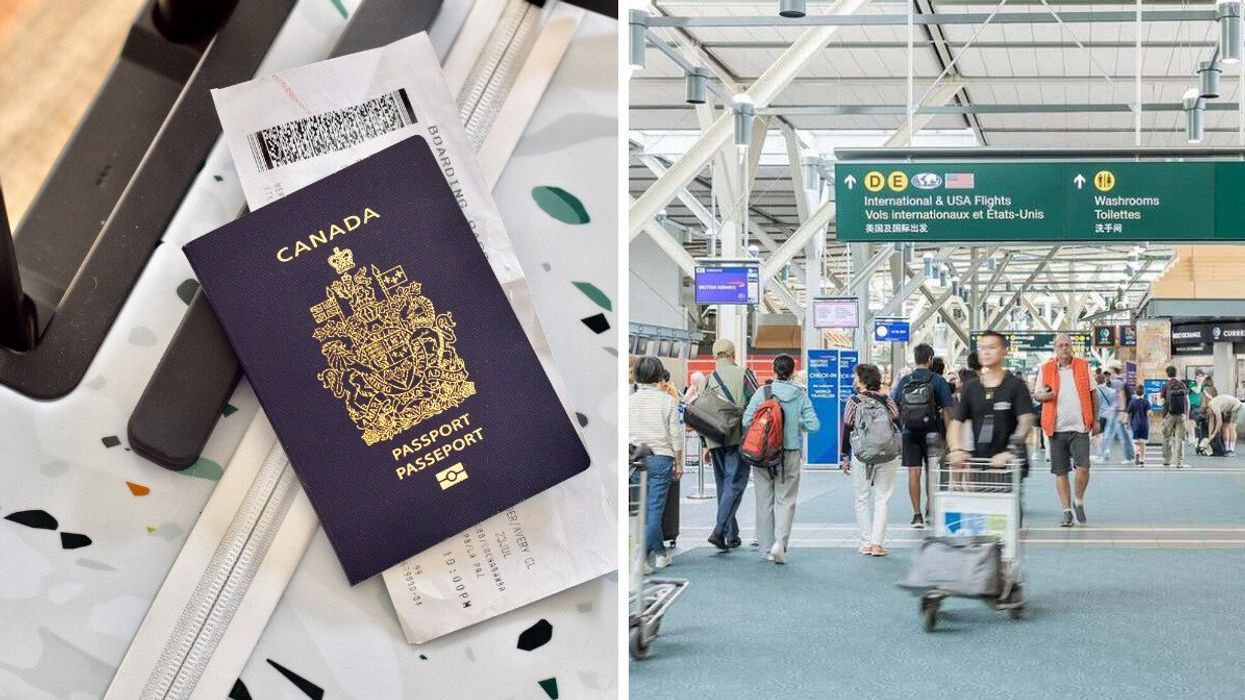The government has issued new travel advice for Canadians going abroad this fall
These travel rules could make or break your trip! 🧳🛫

Global Affairs Canada has released new tips and advice for Canadians travelling this fall.
Heading overseas this fall? If you've got a trip planned, there's some new Canadian travel advice you'll want to go over first.
The federal government has shared a fresh round of travel warnings and safety tips for anyone leaving the country — whether it's your first big getaway or just your first one in a while.
The latest guidance covers everything from passport rules and travel advisories to web safety, travel insurance and international driving rules. And if you're not careful, skipping over a few of these steps could lead to big problems — like getting turned away at the border or stuck with a massive bill if something goes wrong.
The latest update from Global Affairs Canada breaks things down into what they’re calling the "3 Rs" — "read up," "register with us" and "reach us." It's all part of an effort to help Canadians feel more confident and prepared before heading out of the country this fall.
Read up: Research before you go
The feds advise Canadians to start with reading up on their destination, and Canada's travel advisories are a great place to start. They're packed with real-time info about your destination — everything from visa rules and entry requirements to health alerts, safety risks and even local laws that could trip you up. According to Global Affairs Canada, checking travel warnings should be "an essential part of your trip-planning process."
Depending on where you're going, you should also find out whether you need an International Driving Permit — not all places accept a Canadian driver's licence. Some countries require a special permit, and without one, you might not be allowed to rent a car or even a scooter.
The same goes for your bank card — some places are mostly cash-based, while others may accept certain cards but hit you with surprise ATM fees or steep exchange rates. The government even warns about card skimmers and money-exchange scams in certain countries.
Another pro tip: check what kind of power outlets and voltage your destination uses. You might need an adapter or a voltage converter, and a power bank is always smart to have on hand. If you don't absolutely need them, the feds advise leaving your big electronics at home and sticking to the basics.
If you're planning to use free public Wi-Fi, the feds are warning Canadians to be aware of the cyber risks. Global Affairs Canada suggests looking into VPNs or adding data roaming or an eSIM to your phone plan to keep things secure.
As for travel documents, you'll want to make sure your passport meets your destination's validity requirements. Even if it's not expired yet, some countries require your passport to be valid for at least six months after your return date. If it's your first time travelling internationally or your passport is expiring soon, make sure you apply for your passport early and give yourself enough buffer time for processing and potential visa applications.
Speaking of visas, make sure you check the entry requirements for any countries you're travelling to (or through). Even if you're only there for a brief layover, you may need a travel visa or electronic travel authorization (ETA).
And if your trip involves connecting flights, the government advises giving yourself plenty of time before flights and between layovers to get through security screening, immigration checkpoints and to find your gates. If it's your first time travelling — or first time in a while — you may also want to brush up on your airline's baggage regulations as well as airport security rules.
Global Affairs Canada is also reminding people that travel insurance is essential. If you plan to do anything even slightly adventurous like biking, surfing, scuba diving or ziplining, you need a policy that covers adventure activities and emergency evacuations. It's one of the easiest ways to have peace of mind and avoid a nightmare situation abroad.
Register: Get official updates
Before you take off, the feds advise registering your trip with the Registration of Canadians Abroad service. It's a quick step that lets the government send you safety alerts about natural disasters, demonstrations or other emergencies in your destination. Plus, if something happens back in Canada, they'll know where to reach you.
It's also a good idea to keep someone back home in the loop. Leave a copy of your travel itinerary with someone you trust, along with backup copies of your passport and insurance details.
Reach out: Know where to find help
Finally, if something does go wrong, knowing how to contact the nearest Canadian embassy or office could make all the difference. Global Affairs Canada recommends saving that info in your phone before you leave. And for emergencies, you can call the Emergency Watch and Response Centre in Ottawa, which is available 24/7.
The bottom line? A bit of prep now can save you from major stress later. So read up, register your trip, and make sure you're ready to reach out if you need help. Then all that's left is to enjoy your trip — wherever fall takes you.
Happy trails, Canada!
AI tools may have been used to support the creation or distribution of this content; however, it has been carefully edited and fact-checked by a member of Narcity's Editorial team. For more information on our use of AI, please visit our Editorial Standards page.
- Canada-US travel advice keeps changing — Here are all the latest rules & ominous warnings ›
- Canada has issued new urgent travel advisories for several popular vacation spots ›
- Canada issued travel advisories for 9 vacation destinations, including Mexico, Cuba & more - Narcity ›
- Canada's US travel advisory was just updated with a warning for LGBTQ+ travellers - Narcity ›